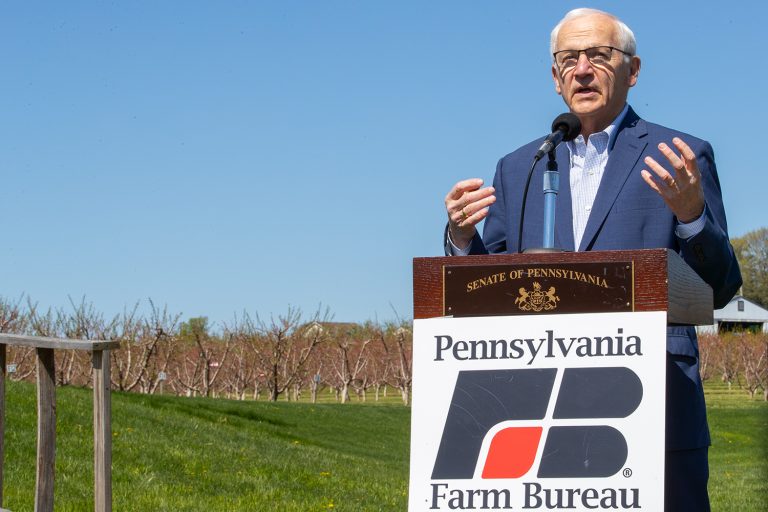
Both the Pennsylvania Farm Bureau (PFB) and the Chesapeake Bay Foundation endorsed Sen. Gene Yaw’s (R-23) Senate Bill 465 during a news conference Monday at Flinchbaugh’s Orchard and Farm Market in Hellam Township.
The legislation would create an Agricultural Conservation Assistance Program (ACAP), which would provide funding and technical support to expand on-farm conservation practices throughout the state.
“Agriculture is looked to for significant reductions to meet pollution reduction goals for the Chesapeake Bay and other major watersheds in the state,” Senator Yaw said. “Unfortunately, almost one-third of our commonwealth’s streams do not meet standards for drinking, fishing or recreation, and agriculture remains one of the largest sources of impairment. To meet the challenges, I have again introduced legislation to establish an Agricultural Conservation Assistance Program.”
Yaw was joined by Andrew Flinchbaugh, a leader in farm conservation work and one of the farmers who advised the state on meeting federally mandated goals for reducing nutrient and sediment pollution in the Chesapeake Bay by 2025. PFB President Rick Ebert and Executive Director of the Chesapeake Bay Foundation’s Pennsylvania office Shannon Gority also joined Yaw and Flinchbaugh.
The proposed ACAP would be similar to the State Conservation Commission’s Dirt and Gravel Roads program, the legislator said. Funding from the program would be distributed to county conservation districts who would then partner with farmers and landowners to complete the conservation projects that make the most sense for their county. The funds would be distributed using a formula that directs additional resources to those areas with the best opportunity for improvement while still benefiting all parts of the state. Funding for the program will come from federal and state dollars, as well as private investments and other sources.
“As stewards of the land, Pennsylvania farmers know that protecting the environment and natural resources is vital to the success and future of our farms and communities,” said Ebert, a farmer from Westmoreland County. “Farmers in the Keystone State have been leaders in implementing practices to improve water quality, but we know there is more to be done. Many of the investments needed are too costly for farms to afford on our own, especially in a difficult farm economy. Senate Bill 465 would provide much-needed support for farmers to work with our conservation partners to grow our conservation efforts.”